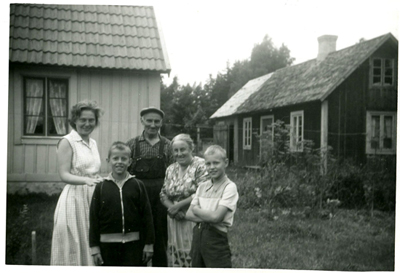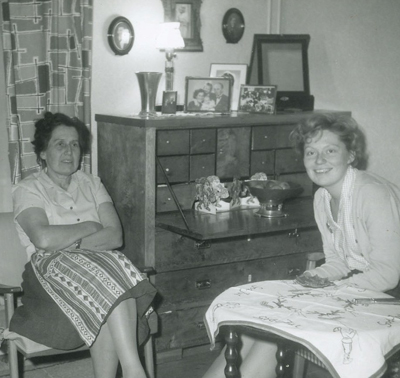MY OWN ROOTS cover three of the largest islands in the Baltic Sea – Gotland, Öland, and the Åland islands. Almost all of my father’s ancestors were “full-blood” Gotlandians, while my mother’s forefathers originated from Öland and the Åland islands. Ever since my personal interest in genealogy began back in the 1950’s it has brought many fascinating discoveries.
ÖLAND ROOTS
A MAN CALLED Lars from the county of Skåne, in the very south of Sweden, one day sent me a letter. He wrote that we were related, and had some pretty interesting ancestors in common – an old vicar family called Axtelius. This family came from the county of Småland in the south of Sweden. Lars wondered if I had any information on this branch of my ancestry. And actually I did, but not much more than the name of the family and the fact they were part of my Öland origin.
SOON LARS AND I were joined by Karl-Erik from the county of Västergötland on this fascinating genealogy quest. As it would turn out the Axtelius family is very interesting, it includes a numbers of vicars, military officers, and others who were well-known citizens in the area of Virserum parish in Småland.
AFTER A COUPLE of years we had sort of a family reunion in Virserum parish, because in the course of researching this branch of our family we got in contact with other genealogists and relatives. It was a very nice gathering. You really make interesting acquaintances and friends through genealogy. I have visited with Lars and his wife Aster several times since that first letter, and I really feel that we are family.
THERE IS ANOTHER very fascinating fact about my Öland roots. Some of my ancestors on the Öland side of the family came from the Swedish mainland in the district of Östergötland, which is situated rather close to Öland. As it seems, one of my relatives is probably an illegitimate child of royal prince – Prince Magnus Vasa, son of King Gustav I Vasa. However, it has not been one hundred percent confirmed yet. The evidence is rather circumstantial. But, it is certainly rather flattering idea to be of royal blood.
 A farmer's family on Öland in the 1950's, Kerstin to the left.
A farmer's family on Öland in the 1950's, Kerstin to the left.
ÅLAND ROOTS
I HAVE VISITED several islands in Europe and Åland is certainly one of my favorites. Unfortunately my research there has not been as successful as on Gotland and Öland. Allotment seamen and their families are not always very well noted in the church records. Ifring is the surname of two of my allotment seaman ancestors.
ONE DAY I got in contact with Göran from Stockholm, who had initated a research project focusing on allotment seamen on Åland. He could provide me with several interesting facts on my family. For instance, one of my ancestors had participated in a campaign on a warship in the Mediterranean in the 1780’s. The Mediterranean is quite a distance from the Åland islands and the Baltic Sea, so that was a really surprising fact. Other relatives participated in many of the other battles during the recurring wars of the 18th century.
 The Åland roots came from my mother Gunhild.
The Åland roots came from my mother Gunhild.
GOTLAND ROOTS
MY ROOTS INTO the Gotland soil are solid. My forefathers were farmers, farmers, and farmers from the very southern part of the island. In fact, they were often related to each other through inter-parish marriages – century after century!
I STILL OWN the family farm Olleifs in Öja parish, which has belonged to our family as far back as there are sources (16th century). According to family tradition it has been in our family’s possession much further back in time, my grandfather said at least since the 12th century. But, it might go back even further. Actually, on our land there are remains of plowed fields from the Bronze Age (some 2000-3000 years ago). Of course I appreciate this piece of heritage very much. Most certainly my own roots in this particular area go back millenniums in time.
I ALSO KNOW very many family stories and traditions from this area, about the region, the farm, and my Gotland ancestors. My main source has been my father and my grandfather. Unfortunately, they both died before I was 25 years old, so much of their knowledge was lost.
FOR A LONG time the people on Gotland spoke a language of their own, closely related to but still rather different from other West-Scandinavian languages (Swedish, Norwegian, Danish etc). Unfortunately, the Gotland language has more or less vanished during the last 50 years, as a result of the influences of Swedish TV, Swedish radio, and tourists from the Swedish mainland. Myself, I only have a basic knowledge of speaking this noble language – my reading skills are excellent, though. This is a result of living too much on the mainland. However, I am a very proud of being elected member of the society for preserving the Gotlandian language (Swedish: “Gutamålsgillet”).
 |
